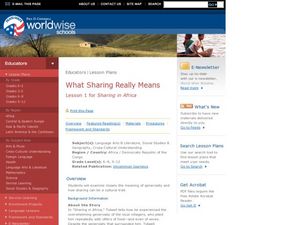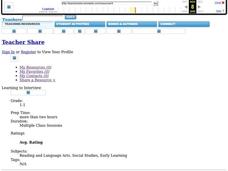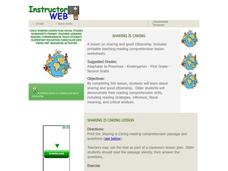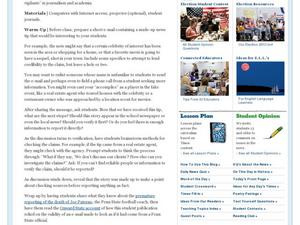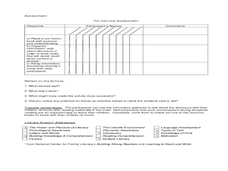Curated OER
Examining What Sharing Really Means
Learners read "The Senegalese Miracle". They discuss the amount of sharing the author finds in Africa. They examine the relationship the author has to the locals.
Curated OER
Examining What Sharing Really Means
After reading "The Senegalese Miracle" about the degree of sharing the author encounters upon arrival in Africa, class members read Mike Tidwell’s “Sharing in Africa” and compare the two stories. This cultural diversity lesson concludes...
Curated OER
What Sharing Really Means
Students examine the meaning of generosity and how sharing can be a cultural trait. In this cultural trait lesson, students read a text about the culture of generosity in Africa. Students complete a discussion activity and journal activity.
EngageNY
Interpreting, Integrating, and Sharing Information about DDT: Using Cascading Consequences and Fishbowl Protocol
What is your interpretation? Scholars look at their Cascading Consequences Charts and interpret the information they have gathered. Learners match claims with evidence and then watch a video. At the end, they carry out a fishbowl...
Curated OER
What Sharing Really Means
Students read the story "Sharing in Africa". As a class, they brainstorm a list of holidays and celebrations in various cultures and identify the Congo on a world map. To end the instructional activity, they focus on one paragraph of...
EngageNY
Interpreting, Integrating, and Sharing Information: Using Charts and Graphs about DDT
Is American growing fatter? Scholars begin with a mini lesson plan on reading charts and graphs using information about Human Body Fat in United States. They then transfer what they learned to charts and graphs using harmful and...
EngageNY
Learning About Farms in Colonial America: Explicit vs. Inferred Information
Aid your pupils in understanding the terms explicit and inferred while teaching them about colonial farmers. The third activity in the module builds off the previous activity and focuses heavily on inference. Learners analyze a...
EngageNY
Final Performance Task: Sharing Visual Representations of Position Papers
Take note! Scholars use sticky notes to record information as they gallery walk to look at classmates' visual representations they created for their end of unit assessment. Learners then choose one word that represents the work they...
EngageNY
Reading and Taking Notes on Colonial Trades
In the tenth instructional activity of this unit, young scholars learn to categorize information as they continue researching their colonial trade. During guided practice, the teacher models how to read informational text slowly while...
EngageNY
Synthesizing Research: How Colonists Were Interdependent
Following the formative assessment of this unit, young scholars present the information they gathered on their specific colonial trade to the rest of the class. Working in groups, learners create posters describing the particular job...
Curated OER
Sharing Information: Schools, Police and FERPA
Students research Family Educational Rights and Privacy Act (FERPA), interview school officials to see how FERPA is interpreted in local schools, speak with community journalists to find out if they have ever had a hard time getting...
Curated OER
Cause and Effect Relationships - Silence of the Bees
Why are bees disappearing? Explore cause and effect relationships with this interesting question. As the detailed lesson plan indicates, start by brainstorming some of the possible effects the disappearance of bees would have on the...
Curated OER
Learning to Interview
An authentic and engaging way to practice literacy skills, this lesson calls for young language arts pupils to conduct interviews with classmates and family members. First, pupils watch as the teacher models the interview process with a...
Curated OER
Sharing is Caring
Learners explore the concepts of sharing and good citizenship. They demonstrate reading comprehension skills including inference, literal meaning and critical analysis.
Curated OER
Check It Out: Verifying Information and Sources in News Coverage
If it’s in the news it must be true, right? Prompted by a New York Times article, class members consider the importance of accuracy in reporting and validating sources. The detailed plan includes warm-up exercises, discussion questions,...
Curated OER
Sharing
Students solve problems based on sharing scenarios. In this sharing lesson plan, students listen to a book on sharing and answer questions. Then the teacher presents different scenarios to the class and they have to problem solve to come...
Curated OER
Digging for Dinosaur Information
Students explore how to locate dinosaur information. They read the book, Catch Me If You Can! and discuss the popularity of dinosaurs among children, identify various kinds of dinosaurs and select a dinosaur to research. TAs they...
EngageNY
Applying Research Skills: “Rachel Carson: Environmentalist and Writer”
It's important to cite sources! Scholars take a closer look at their research about DDT by examining how to cite sources. Learners take turns sharing information that would be used to cite sources to complement Rachel Carson:...
EngageNY
Researching Facts
How did the 1906 San Francisco earthquake and fire affect the city's inhabitants? Scholars embark on a quest to discover the answer as they work in small groups to research articles about the event. They finish by completing a jigsaw...
EngageNY
Text-Dependent Questions and Making a Claim: Digging Deeper into Paragraphs 20–23 of Steve Jobs’ Commencement Address (and connecting to Chapter 11)
In preparation for the unit exam, groups employ the strategies they have been practicing to formulate an interpretative claim about the connections between Christopher Paul Curtis's " Bud, Not Buddy, and Steve Jobs' 2005 Stanford...
EngageNY
Grade 9 ELA Module 4, Unit 1, Lesson 4
Class members continue examining how writers develop and support their ideas by comparing two texts about globalization. Alongside chapters from Sugar Changed the World, young scholars read an article by the World Bank entitled...
Curated OER
Finding and Authenticating Online Information on Global Development Issues
Learners discover how to find authoritative resources. In this research skills instructional activity, students examine strategies for using the Internet effectively to research global development issues.
Curated OER
Sharing is Caring
By engaging in an arts-based activity, 2nd graders explore peace in the classroom. They listen to the story The Rainbow Fish, then create their own fish to hang in the classroom. They write three things that make them happy on their...
National Council of Teachers of English
A Bear of a Poem: Composing and Performing Found Poetry
Scholars work collaboratively to compose a found poem from one of their favorite stories. With a finished product in hand, class members form a circle and perform their work for an audience by taking turns reciting one line till the poem...




